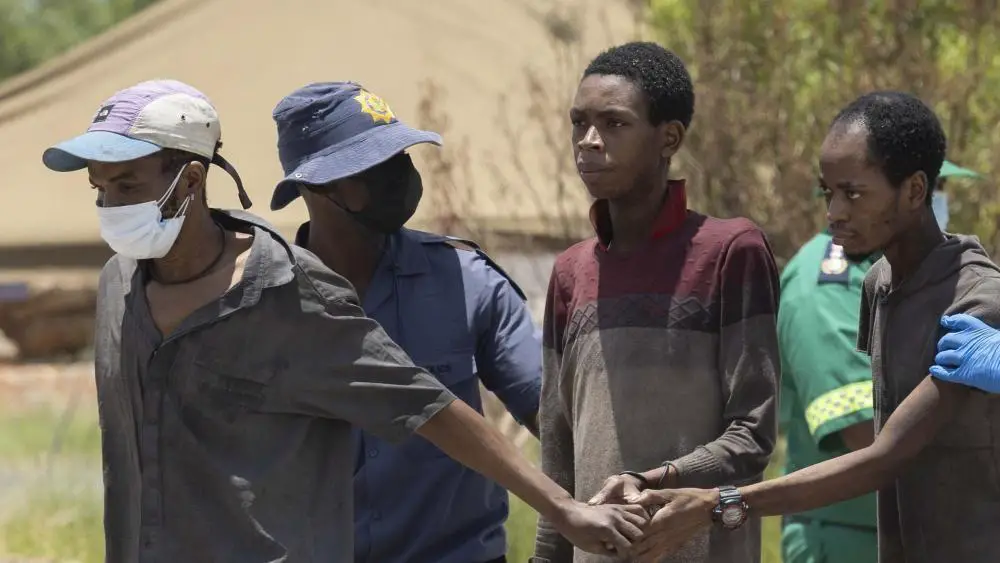
LONDON — A Colorado mom who is fighting extradition from Britain to the United States allegedly drugged her children and told them to close their eyes before fatally shooting and stabbing two of them, a court heard on Wednesday.
Days after the lifeless bodies of her children, aged 7 and 9, were found at her home in Colorado Springs on Dec. 19, Kimberlee Singler was arrested London on Dec. 30 after flying to the U.K.
Singler, 36, is resisting American attempts to extradite her on the grounds that her alleged crimes — which she denies — carry an automatic sentence of life without parole, which her legal team argue is a breach of the European human rights law.
Article 3 of the European Convention on Human Rights — a legally binding statute followed by 46 countries, including the U.K. — prohibits “inhuman or degrading treatment or punishment.”

Westminster Magistrates Court in Central London heard details of how she allegedly killed her children and is then said to have covered up her crimes.
The seven charges she faces, brought by the Colorado Springs Police Department and the FBI, include two counts of first degree murder after deliberation and two counts of murder of someone under 12 by a person in a position of trust.
She is also charged with the attempted murder of a third child, 11, who survived despite serious injuries and was told to lie about the ordeal, the court heard. The surviving child told police the perpetrator was a man who entered the home, but later told a foster carer that her mother was responsible for the attacks.
Singler said that God told her to do it, the court heard.
Singler, who will give evidence in the three-day hearing, spoke only to confirm her name and date of birth. Edward Fitzgerald KC, her attorney, said that she denies the charges against her and insists she is innocent.
Joel Smith KC, the attorney representing the U.S. government, said that the killings happened in the context of an acrimonious custody battle between Singler and the children’s father.
Singler had been ordered to transfer them to his custody, but failed to do so, Smith said. On Dec. 19, the day after a court order was issued, police responded to an emergency call at Singler’s home and found the two children dead.
“She shot the first child in the head and stabbed her in the neck, she shot the second child to the head and stabbed her in the neck. She attacked the third child to the neck with a knife causing serious lacerations,” Smith said.
Police found the two dead children lying in bed together.
Investigators also found live rounds and spent cartridges were found in a closet, as well as a gun that had been handled by someone with blood on their hands, and a blood-stained knife, the court heard.
In the kitchen trash were two empty bottles of sleeping pills, Smith said. There had been no sign of a break-in.
“(The surviving child) said that the defendant had told the three children to close their eyes, she guided the first two children into the bedroom and approached the third child and told her to close her eyes. She then cut her to the side of the neck,” Smith said.
Smith argued that there was no barrier to Singler being extradited in human rights law because crimes in the U.S. can be commuted by the governor. A life sentence, which Singler is almost certain to receive, should not be a barrier to extradition, he said.
“In America, if there’s an executive clemency route, that is sufficient. It does not have to be a judicial route,” Smith said.
Fitzgerald, who also acted for Julian Assange in his long-running extradition case in London, argued that it would be unlawful to extradite someone who faces life without parole without considering any mitigating factors.
The U.K. has 63 people under life sentences while the U.S. has 49,000, he said.
“It’s totally alien to us … to say ‘I would sentence you to life without parole’ simply because of the category of the offense, without considering any of the person’s circumstances,” he said.
“Here is a person with her first offense, a devoted mother, who does this out of the blue,” he continued. “Are we to say that this mandatory imposition of this sentence of life without parole … would be fine?”
The hearing is expected to last three days.







